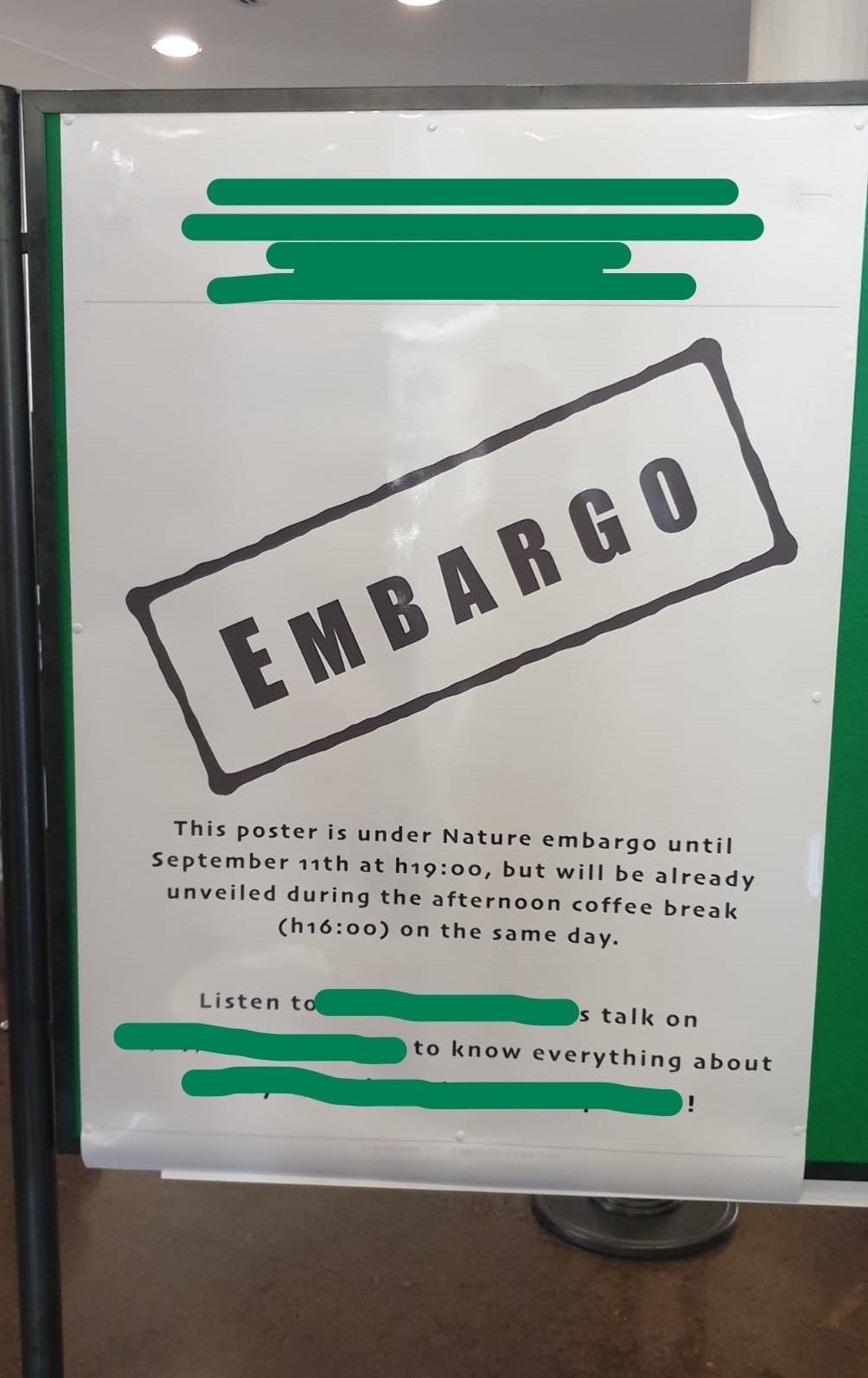Demystifying the editorial, peer-review and publishing process at Nature journals
Published in Astronomy

As Nature journal editors, it is our job (and often our pleasure too) to interact with our communities and our authors. This usually includes answering questions about the ins and outs of how the editorial, peer review and publishing process works and keeping authors and peer reviewers informed and hopefully happy.
What is the most frequently asked question that I receive as an editor? It's probably a toss-up between "Can I put my paper on the arXiv?" and "When will my paper be published?".
So let me tackle the first one here, as it is something about which I often find my authors being confused and generally the community being wildly misinformed. What is the fabled "Nature embargo"?

Not the example pictured above! In fact, if you look at our Press & Embargo policy, you will find that not only do we allow communications between scientists before the publication of a paper, we actively encourage it! It is after all how science works! Moreover, our Preprints & Conference Proceedings policy allows you to put your manuscript on the arXiv or any other preprint server to maximize its impact and facilitate early community feedback.
So let's break it down. What do our policies allow you to do and what not?
- You can present your results at conferences and even publish proceedings about them (as long as your submitted paper is not a duplicate of your proceedings and the proceedings are not peer-reviewed).
- You should not actively solicit media coverage of materials submitted to Nature journals. You can however discuss accepted contributions with the media only once the publication date has been confirmed and no more than a week before the publication date under our embargo policies.
- You can put the originally submitted version of your paper on the arXiv or any other preprint server, personal or institutional website at any time (yes, even before you actually submit it to us).
- Prior to acceptance, you can mention that the paper is “Submitted to a peer-reviewed journal”.
- If accepted and prior to publication, you can mention that the paper is "Accepted for publication in a peer-reviewed journal".
- Post-publication, you can mention that the paper is "Published in Nature XXX, DOI: YYY.YYYYY".
- You can put your version of the accepted paper on the arXiv or any other preprint server, personal or institutional website the earliest 6 months after the official publication date of your paper. You can mention that the paper is "Published in Nature XXX, DOI: YYY.YYYYY". You can even provide the SharedIt link, to allow free read-only access to everyone.
- You are not allowed to upload the final published PDF version of your paper on any arXiv, preprint server, personal or institutional website, at any time. But remember, the SharedIt link mentioned above, provides free read-only access to that exact final published version of the paper.
How about discussing your paper with the media/journalists prior to publication? It is sometimes the case that science journalists monitor preprint servers or attend big conferences and they may approach you about the results you just uploaded/presented. Don't panic! Talking to them is not a de facto breach of our embargo. There are a few things you should/can do:
- If your paper is not published yet, you should clarify that your paper is still under peer review and as such the results and corresponding conclusions can still change!
- You could provide technical clarifications about the paper without offering quotes or providing an interview about the results and implications.
- In case of doubt, you can always ask for further clarification about our embargo policy by contacting the Nature Portfolio press office by e-mail.
Ultimately, we know that journalists may choose to go ahead with covering a paper before its publication date, even if you do all the above. We will not hold that against you or your paper. It is a fact however that coordinated media coverage of a paper leads to much better results in terms of impact and reach.

Do you have more questions about how the editorial, peer review and publishing process works at Nature journals? On the 16th of June, at 13:00 GMT, join me and 7 other astronomy-handling editors at Nature journals (including Nature, Nature Astronomy, Nature Physics, Nature Reviews Physics, Nature Communications, and Communications Physics) to get answers to all your questions.
You can register for this virtual event here. I hope to see many of you there!
PS: Fun fact: most Nature journal editors are not werewolves and as such the lunar phase does not affect our editorial decisions!
Follow the Topic
-
Nature

A weekly international journal publishing the finest peer-reviewed research in all fields of science and technology on the basis of its originality, importance, interdisciplinary interest, timeliness, accessibility, elegance and surprising conclusions.
-
Nature Communications

An open access, multidisciplinary journal dedicated to publishing high-quality research in all areas of the biological, health, physical, chemical and Earth sciences.
-
Nature Astronomy

This journal welcomes research across astronomy, astrophysics and planetary science, with the aim of fostering closer interaction between the researchers in each of these areas.
-
Communications Physics

An open access journal from Nature Portfolio publishing high-quality research, reviews and commentary in all areas of the physical sciences.
-
Nature Physics

This journal publishes papers of the highest quality and significance in all areas of physics, pure and applied.
-
Nature Reviews Physics

An online-only journal publishing high-quality technical reference, review and commentary articles in all areas of fundamental and applied physics.
Related Collections
With Collections, you can get published faster and increase your visibility.
Women's Health
Publishing Model: Hybrid
Deadline: Ongoing
Structured light for free-space applications
Publishing Model: Open Access
Deadline: Mar 31, 2026




Please sign in or register for FREE
If you are a registered user on Research Communities by Springer Nature, please sign in